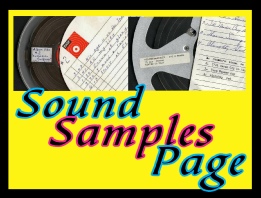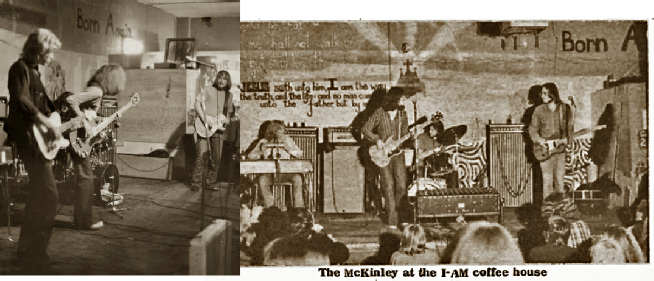
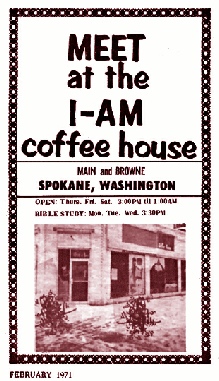

The Wilson McKinley Story
The Story of the Pioneering Jesus Rock band, Wilson McKinley
Revised and Expanded for their Fiftieth Anniversary, 2020
By Timothy Smith, from Original Sources
Introduction to the 50th Anniversary of the Wilson McKinley as a Jesus Rock Band, and the 30th Anniversary of This Article
Those familiar with the articles on Tanignak.com will know that the Wilson McKinley
is a group that I mention frequently. Their music and their ministry were a huge
influence on me in the 1970’s. Then in the late 1990’s, I had the privilege of releasing
their music for the first time on legitimate, band-
I never got to see the Wilson McKinley perform live, and didn’t even have all of
their albums until a year or so before I began a hunt for their master tapes. But
in that search, a lot of unreleased material came my way, much of which they had
forgotten about! So now, as I prepare their latest CD, of live performances from
1970-

Original Introduction (1999, revised 2020):
Their scarce vinyl LP’s, released privately through concerts and mail order five
decades ago, can now command hundreds of dollars from collectors across North America,
Europe and Asia. Their mystique seems to grow by the year among their few but avid
fans, and every year more people are drawn to their vital music and compelling story.
They are the Wilson McKinley, a West Coast guitar-
In the early 1970’s, there were solo artists who produced Christian Rock. But the
Wilson McKinley seems to be unique: the first known band to come out of secular rock
and roll and into Jesus Music name and all, bringing their instruments and rocking
style with them. Theirs is a fascinating story, a moving testimony, and as pertinent
now as when it was taking place. If you were one of the people who were blessed enough
to witness the band in person, or worked with them, this ongoing interest may be
a bit unnerving. That is because the Wilson McKinley tried to adopt a humble, self-
The band logo for the Spirit of Elijah LP is the most common one for the Wilson McKinley. Artwork for the band and the Truth newspaper was often the work of drummer Tom Slipp.
The Wilson McKinley’s written history (until 1999 when this article was first posted)
was sketchy at best and wildly inaccurate at worst, usually coming in the form of
short blurbs about their LP’s on somebody’s list of the “Top 100 Christian Rock Albums
of All Time” or even “Most Intriguing Psych-
The Early Years, 1968-
The Wilson McKinley were already a well-
One such company, impressed by their ability to competently play all types of rock,
the budget label Alshire (home of the ubiquitous 101 Strings franchise) hired them
in 1969. They tapped the Wilson McKinley to be their in-
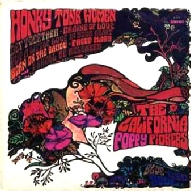
The Alshire release of the “California Poppy Pickers” This release featured the original lineup of The Wilson McKinley. Below: a snippet of two of the cuts from the 1969 “Honky Tonk Women” LP:
For their part in the Alshire adventure, the Wilson McKinley earned enough to record
a three-
One incident that took place around this time demonstrates how God was working on their hearts. They were offered a deal with a major record label, but only if they would tone down their spiritual songs. The band by this time was including a lot of songs such as “Jesus is Just Alright With Me” and other Byrds numbers, and even songs they had written that had spiritual messages, into their sets, and the label would have none of it. The band held a meeting and unanimously voted to reject the offer in favor of more artistic freedom. So even then, God was obviously working on members of the band.

The Wilson McKinley’s single on Rocking Chair Records, released in 1970. The other side featured “Blues Go Home,” by Mike Messer
Blues Go Home sample
Personal Conversion and the Rebirth of the Band
In early June of 1970, a group of Jesus People (“street Christians”) came to town
for some street meetings at Highbridge Park in Spokane. A local minister with a heart
for street ministry, Carl Parks, participated in the meetings, helping the Jesus
People to establish a local base of operations. The meetings were the talk of the
town across Spokane, and eventually caught the attention of the members of the band.
Curious, several members went to the park and over the course of a couple of visits,
ended up becoming followers of Jesus. Convinced now that the rock-
Whether the one member left the band or the other three left to join the believers, the Wilson McKinley essentially dissolved at this point. “And they left everything and followed Christ” (as Peter, James and John had done in the first century). They joined Carl Parks and the street Christians as they witnessed across the city, convinced that they had left rock and roll forever. The three new believers felt strongly that the club scene and the rocker lifestyle were incompatible with their newfound faith, and what’s more, they didn’t miss it. Mike Messer describes their experience as sheer joy and confidence in their Lord, as they were filled with a sense of fulfillment and purpose they had never known before. They left everything to follow Jesus, and realized that what they left behind wasn’t all that much after all.
The individual former band members took up their duties in the street ministry led
by Parks, and lived communally (and frugally) with the other believers in the organization
which was now known as Voice of Elijah ministries. Although they all participated
in the music and worship, none of them ever expected to be on stage as a rock band
again. The next step in their journey was as low-
At first, the songs that the Wilson McKinley came up with were rock arrangements
of folk spirituals and rewritings of current rock hits to feature Christian lyrics.
But it wasn’t long before original Christian Rock compositions joined their repertoire.
They quickly realized that they needed to reconstitute a full rock band if they were
to do justice to the music ministry they had begun. Jimmy Bartlett, bassist and vocalist
of Sleepy John, an Idaho band, had impressed Mike a good six months before the Wilson
McKinley’s conversion. Jimmy was a believer, but working in a secular band. His
joyful faith had a great impact on Mike. So soon after they decided to be a band
again, the remaining three, Mike Messer, Randy Wilcox, and Tom Slipp, drove down
to Lewiston, Idaho, and picked up Jimmy Bartlett. On the drive home, Mike remembers,
the band really melded together, and had a powerful, Spirit-
Jimmy took over the job of bassist, became one of the lead singers, and joined the
others in writing new, Christ-
One song from a practice tape from late 1970 (included on the Now I’m a Jesus Freak anthology) takes on the excitement of those days, admonishing onlookers that this was no drug trip, political movement or passing fad, but something entirely different:
“Jesus came in, cleansed me from sin,
And now I don’t have to fake it!
It’s all right; it’s Jesus Christ!”
The On Stage LP
The Wilson McKinley’s first album as believers would most likely have stopped their
career cold if they still possessed the old rock-
The On Stage album abounds in balance and fidelity problems, missed cues, dropouts
and crude edits, and features several songs of (to be very kind) only limited value.
Due to haphazard mic placement, the loud congas and the country-
When the boys heard the tape, which was recorded without their knowledge, they were understandably appalled. But the LP was released nonetheless, billed as “Powered By the Holy Spirit!” In that sense it lives up to its billing, because it is one of the best testaments to the joy of conversion that one could hope to find. Mixed among the sometimes raucous music are spontaneous cries of “Hallelujah, Jesus!” and “Oh, Jesus, have your will tonight!” The original songs have some of the same insistent exuberance (in a line quoted in Time Magazine):
“Word’s getting out fast, the world ain’t gonna last,
One day you’ll look around and find us gone,
Baby, won’t be that long, yeah!”
Anyone who had ever seen the Wilson McKinley through the smoky haze of some club would have been very surprised. But anyone who was even slightly curious about what this Jesus Movement thing was would have gotten an earful that night! Yet the sweetest sentiment on the album comes from one of the most miscued and unpolished songs on the album: “Jesus, I’m standing here with tears in my eyes, and I’m telling you from my heart that my love for you never dies!” There’s no denying the passion that was now part of the Wilson McKinley’s performances, and no denying why they were acting that way: “That’s the Love of my Saviour!” (Hear Randy’s beautiful remake of that song on disc 2 of Now I’m a Jesus Freak).
From the information found in old editions of the ministry’s Truth newspaper, the
entire community of believers was up to their ears in road trips, street ministry,
feeding the homeless and studying God’s Word. The band’s first album was promoted
heavily in the Truth paper, and community members were enlisted to hand-
The reach of the Voice of Elijah ministry was already far beyond the confines of Washington State, or even the road system. Truth featured articles from across the US and Canada, and as far away as Paris, France. I first heard of the Wilson McKinley when someone in the growing fellowship of young Jesus People in Kodiak, Alaska got a copy of the Truth paper. We promptly ordered a couple of bundles per month to pass out on the streets. We really did that; fifteen degree weather, blowing snow, amazed drunks, annoyed merchants and lots of curious neighbors eyeing us with suspicion but usually taking our Truth papers just the same!
We even sent the newspaper an article about us, and we got published in the January, 1972 issue. That’s me in the front row in the group photo, flashing the “One Way” sign. A sweet old Russian immigrant named Nina Gilbreath, about the only adult who stood by us, ordered a few copies of the On Stage LP, and gave one to me. I listened to it a couple of times a day for a month, usually dragging some hapless acquaintance to listen with me, accompanied by “Can you believe that? This is a rock song about Jesus!” That LP was a watershed event for me, inspiring my Christian walk, my own music ministry. The band’s rewrite of “He is a Friend of Mine” is the first song I ever sang lead on in 1971, and was covered on my Stone Table String Band album. Stories far more dramatic than mine abound, and need collecting. If you have a testimony of those days, send me an email. The Wilson McKinley had a deep and lasting impact on thousands of young Christians in the early 1970’s.
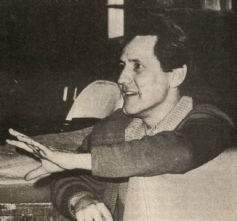

Right: Carl Parks, the leader of Voice of Elijah. 1973 photo from the Truth paper.
“The boys explained that they didn’t know anything except rock, and I said that would be fine.” June, 1970 – thus beginning the Wilson McKinley’s storied career as Jesus Rock pioneers!
“We were never seeking to start a movement. We were looking for a revival!” – quotes by Carl Parks, from a 1982 phone interview.
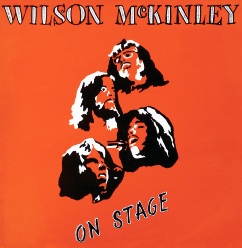
The On Stage LP was released in 1970. Left: the original, hand-
Recorded in mono, without the band’s input or approval, and showing all the rough edges of a new lineup and new material, the LP still reached legendary status as the first Jesus Rock album released by a rock band. And its most attractive feature is the raw energy, spiritual intensity, and spontaneous joy in evidence in many of its tracks. Below are two tracks from a mint LP (since no masters exist). On this LP, and for the first few months of touring, the band was joined by Lou St. Cyr, a percussionist who played congas. That sound is one of the memorable features of this album and the Gonzaga concert in November of 1970.
(Sample) A traditional spiritual: I Know The Lord – This track shows a little of the band’s future versatility and improvisational skills, in evidence in the live tracks from the “I AM” coffee house. This track is on the Now I’m a Jesus Freak CD.
(Complete) An original song: Coming to Take His Children – There are three surviving live recordings of this song, all with garbled lyrics. This is the first release of the edited and corrected LP version, which had an obvious tape splice.
(Sample) Original song: You Gotta Hear About My Friend The one On Stage track that got some local airplay, and quoted in Time magazine, from the mix on the Message Brought to Us CD (from a mint LP – no masters exist for On Stage).
Top Left: the Truth paper’s masthead. Top Right: Nina Gilbreath, the wonderful saint of a lady who supported us kids so much, and gave me my first Wilson McKinley album, with two Russian refugees she was sponsoring, in her home in 1971. Left: a blurb on the front of the January, 1971 issue of Truth advertising an article about the Kodiak Jesus People (I’m in the front on one knee, flashing the “One Way, Jesus” sign.

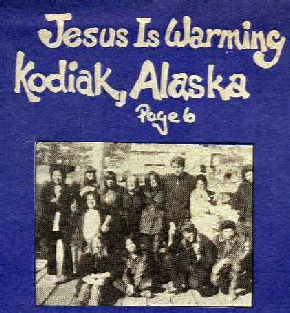
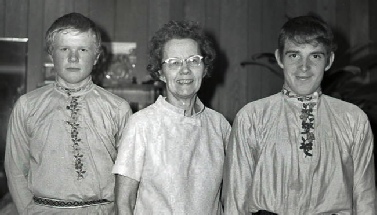
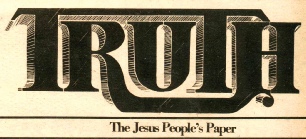
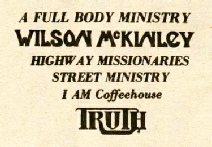
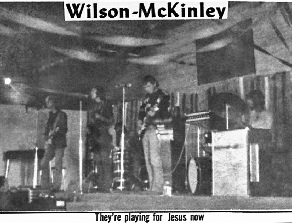
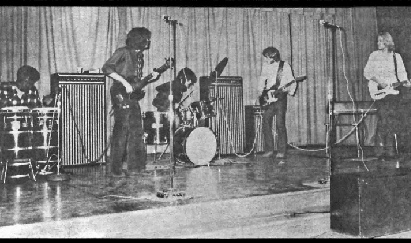
Top Left: a photo in Truth, shortly after their first LP, said, “The thundering, driving sounds of ‘solid’ Gospel Rock music as performed by the Wilson McKinley has built up quite a following, although it is true what they say: ‘It’s all Jesus, man!’” Top Right: A description of Voice of Elijah Ministries’ “Full Body Ministry.” Right: another 1970 photo said, “They’re playing for Jesus now!”
The Voice of Elijah Organization and Whole Body Ministry
Meanwhile, back in Spokane, the style of ministry at Voice of Elijah was developing
into what they called “Whole Body Ministry.” It was a terrible way to run a band,
if your goal was national exposure, radio airplay, or a lucrative recording contract.
But it was a selfless and rarely-
A quote in the Truth newspaper from a band member is instructive:
“At first I didn’t understand how we could be used to spread the Gospel. I had concluded that Rock was evil, and I didn’t even want to play it. I quickly found out different. We learned that we could function as a drawing card. Showing the street people that Jesus isn’t bound by a certain mode of music helps to make them understand how much freedom there is in Christ!”
Even as the Wilson McKinley became more comfortable in this new genre of Jesus Rock,
they were also at the top of their craft as rock musicians. Their reputation actually
grew, although old fans eyed the new spiritual dimension with considerable suspicion.
The band even showed up at local rock festivals to boogie with the other bands, but
now the rest of the staff were out there in the crowd making contacts, witnessing,
and even leading people to the Lord in the middle of a rough-
Another important venue for the band and the other ministries of Voice of Elijah
was their new coffeehouse at Main and Browne in Spokane, just down the road from
a local nightspot which featured secular rock bands. The “I Am” coffeehouse, in a
vacated one-
Some of the best performances that were ever recorded by the band were laid down when the Wilson McKinley was just having an average night at the “I Am”, but some high school kid with a reel to reel showed up and taped them. Michael Sheets, who graciously put his finishing touches on the artwork for Now I’m a Jesus Freak, contributed half a dozen tracks to that project. He had been one of those young men with a Roberts tape deck, and provided some of the dazzling performances he had recorded. The band was always at their best in front of a live audience. Yet the unofficial recordings from the “I Am” show that the band was energetically focused on sharing the Good News as clearly as possible. Many of the songs they sung at the “I Am” were shared from group to group far beyond the boundaries of their tour bus, blessing many young believers across the planet. And the songs are about to travel outward yet again!
The Fiftieth Anniversary live project, Rolled Away the Stone, features an amazing
forty-
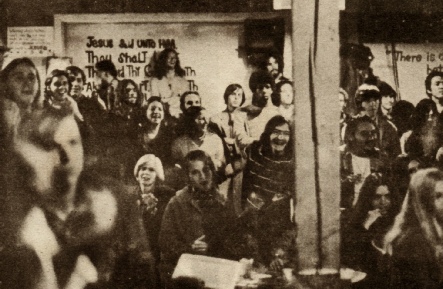
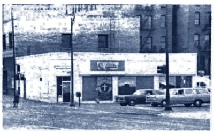
Scenes from the “I Am” coffeehouse at Main and Browne in downtown Spokane, 1971-
The Spirit of Elijah LP
In late summer of 1971, the band released its second LP, the critically acclaimed Spirit of Elijah. In both graphics and audio quality the album was light years from On Stage, and the performances and songwriting reflected the talents of a very solid rock band. The back story of the LP’s recording session is the stuff of legend. Collectors around the world eagerly seek out the original records, frequently shelling out big bucks for them. In fact, since this website published the original article in 1999, someone in Europe has seen fit to release a pirate CD version of that album, replete with quotes from my original article! As unfair as that is to the band (and who would deliberately steal Jesus Music anyhow?) it is a compliment of sorts to a record that is easily one of the top 100 Jesus Rock albums of all time.
So here’s the story: several of the guys were living in a small two-
When the closest guitar would crank up, the drum set would rattle. Some of the vocal
mixes are a little off, the volume of the bass amp varies widely, and there are several
instances of little imperfections that are very noticeable in the unedited reel tapes.
One of the songs runs out of tape a few seconds before the band stopped playing,
another has pitch variations as the reel caught a bad patch of tape. And it all sounds
perfectly fantastic, a classic, “fly on the wall” testament to the Wilson McKinley
at the top of their craft. The LP featured spacey double-
The tracks of Spirit of Elijah are almost uniformly strong, as Rock and Roll and as Christian witness. The band took its last foray into rewriting secular material on the first two tracks, revising Moby Grape’s “He” and the Moody Blues’ “It’s Up to You.” The latter track mimics the original guitar licks, but manages to veer as far away from the genteel sweetness of the Moody Blues as could be imagined, with an edgy, almost urgent treatment. Their version made it into the playlist at the “I Am” for several years. The other “cover” song was a rock rebirthing of Fr. Peter Scholtes’ anthem, “They’ll Know We are Christians By Our Love,” known popularly as “We are One in the Spirit.” Here again, the edgy vocals and driving instrumentation of the Wilson McKinley combine to make this song their own.
The rest of the tracks on the LP are all originals, including songs that would be part of their ministry until the end. The title cut was described by a listener at the time as “a musical version of the end of the world.” It certainly approaches that, with complex rhythms and dynamics, several extended instrumental interludes, impassioned vocals and soaring harmonies, a spooky and barely audible opening narration by Tom Slipp, and the loudest appearance of Tom’s drums on the album. Other standouts include “Tree of Life,” featuring Randy on electric piano, and a shift in rhythm midway that elevates the track into a driving anthem to the band’s philosophy of ministry:
I know I’ll never be alone,
I know this world it ain’t my home
And so, my eyes are opened up,
Living the life of a servant of God is enough!
One of the finest moments is in one of the slower songs, as Randy’s haunting, earnest
vocal on “Come on Home” gets more powerful with each hearing. And the amazing full-
So what makes Spirit of Elijah such a classic? One could argue that the whole is
greater than the sum of its parts, and there’s a point to that. But some of the parts
are pretty special. The Wilson McKinley’s songwriting was finally at the forefront.
The recording quality this time was at least an approximation of what listeners in
the early 1970’s expected in terms of stereo mix, fidelity and clarity. The front
cover artwork was in tune with the times, and has stood up well over the years, especially
considering how limited their budget was. The back cover photo managed to capture
all of the fervor of their street ministry, of young people who strongly believed
in a Jesus who is not only alive, but on His way back. On this record, the band sounded
like a cohesive unit that could jam very effectively, even in an all-
In short, those fans who felt that the band had sold themselves down the river with this Jesus thing got a real earful of convincing contrary evidence with Spirit of Elijah. Instrumentally the sound was solidly “hippie rocker” in a genre (Jesus Rock) that still had precious few participants. Lead vocals highlighted the strengths and varied styles of all three of the singers, and they frequently traded lead and harmony duties even within individual lines of songs, giving this album extra vocal punch and versatility. But for me, one of the standout features is Tom Slipp’s fabulous drumming, of which this album is the best recorded example. He could elevate and energize any tune, play in any rhythm, and add those famous fills that prompted one of the band members to compare him to Ginger Baker. Terry Sheets captured all of it in stunning stereo, and it’s quite the frosting on this already fabulous cake. The new digital remix of these tracks, available in full on Now I’m a Jesus Freak, gives everyone a chance to hear this amazing album in the closest approximation yet to what it would have been like to be there that night in the House of David.
When the album was finally released in August of 1971, Truth naturally advertised
it heavily, and truth be told, the band and the ministry were proud of how it turned
out. But it was a Wilson McKinley Jesus Rock album, meaning it was made on a shoestring
budget, the vinyl was a noisy pressing, the ministry could only afford to add reverb
to one side of the disc, etc. etc. – the pattern of unfortunate distractions that
all official Wilson McKinley products had. Yet its very high reputation, including
among secular “Psych-
What’s a wretch like me doing with all of this Joy?
Jesus, He’s my everything, and I’m just His boy!
Samples from the CD mixes of Spirit of Elijah:
Tree of Life Original song, a signature concert song for the next decade
His Eye is On the Sparrow Cover – new tune, old hymn lyrics
It’s Up to You Cover song with Christian lyrics

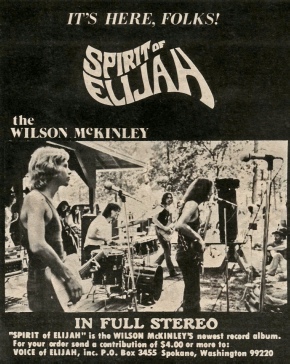

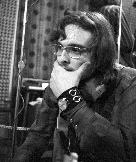

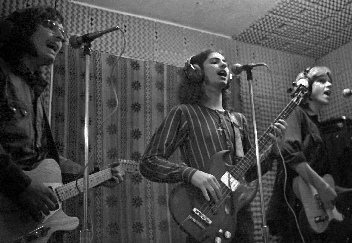
Three photos from the April, 1971 recording session for Spirit of Elijah at the House of David. Photos by Dave Joern. Far right: Mike Messer listens to playback.
Above: Three ads in Truth for Spirit of Elijah. The album’s logo was designed by
Dave Joern. Stereo was no big deal in the music industry by 1971, but after the disappointment
of On Stage, perhaps the editors of Truth wanted to reassure everyone that this LP
was different! Below: the cover of Spirit of Elijah, a masterpiece in low-
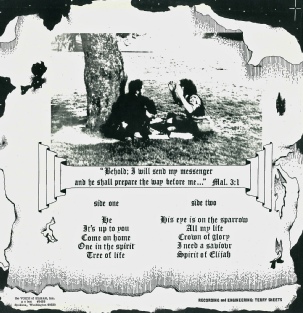
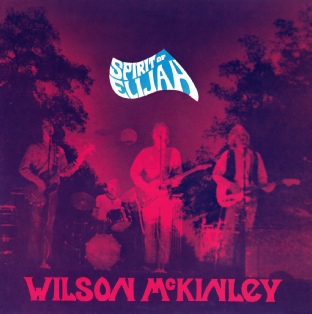
In The Studio: the Heaven’s Gonna Be a Blast LP
Barely six months after the release of Spirit of Elijah, in February 1972, the Wilson McKinley released their third and final Jesus Rock LP, a soaring achievement in songwriting called Heaven’s Gonna Be a Blast. To give music historians a sense of perspective, consider this: in February 1972, Love Song had yet to release their first, classic Jesus People LP. Larry Norman was readying his first national release (Upon this Rock having been dropped by Capitol) called Only Visiting This Planet. And the Wilson McKinley was releasing their third Jesus Rock album, selling it at their concerts and through ads in the Truth paper, which by now had a street circulation of over 120,000 copies a month.
The album was an immediate sensation, with its psychedelic yellow, cyan, and magenta
colors, the slightly oversized cover a throwback to the homemade On Stage. The Truth
paper boasted about the five-
Here’s the story behind the strange mix. The fact that a “professional” studio was
used and that Sound Recordings, Inc. helped in the production of the album didn’t
keep the LP mix from major flaws: huge dropouts, a bass-
When the time came for final mixdown, everyone in the band realized they had no real
soundboard experience, and they could not undo what the original engineer had done.
The original mix was horribly thin, and the vocal tracks had quite a bit of distortion.
But the band managed some tasty overdubs, including some creative percussion work
by Tom, which helped widen the sound a bit. Then when the record company heard the
masters, they were finally convinced that the tracks needed bass. So they decided
to heavily equalize the dubbing master, inadvertently compounding the problems. The
dubbing tape suffered from several instances of major dropouts, which made it straight
to the LP, and the engineer heavily boosted the mid-
But the muddy sound is not what anyone remembers about this LP. The songs are astounding,
and every one is a Wilson McKinley original. Mike, Jim and Randy wrote individual
and collaborative numbers that are among the very best Jesus Rock ever penned. In
keeping with their primary role in live appearances, that of getting a crowd’s attention
while the street workers witnessed in the audience, many of the songs feature a loud,
in-
But some of the strongest work on this or any other Wilson McKinley recording is found in their softer numbers, which exhibit a maturing songwriting ability and a deepening spiritual walk. “Almighty God” has an almost dreamlike quality to the lyrics, as the soft jazz accompaniment of the instruments lends a mesmerizing wall of sound, as “Almighty God stands and stretches His hand…,” insistently calling us to His side. Their philosophy of ministry is again apparent in “Never Cry No More,” when they sing:
Well, my home is in another land, Where Jesus is the King,
He doesn’t rule with an iron hand, (It takes a servant to be a King).
There’s a beautiful, worshipful feeling to the lyrics of “Like a Warm Summer Day,” and the instruments almost perfectly propel the message along. The coolest lines come from “Wish I Had the Words to Tell You,” which incidentally trumpets the fact that Jimmy wrote it while playing his electric bass. The words declare:
When the kingdoms turn to ashes, And the pride of Man falls down,
Then the ones who really love Him, Make a loud and joyful sound
If you need to know why He came, Just take a look around!
In short, Heaven’s Gonna Be a Blast holds up well under repeated listening, as we hear more of the instrumental and lyrical creativity that mark this as another milestone in Jesus Rock. Now that the original master tapes have been digitized, and the bass and balance problems have largely corrected, this album sparkles like no other Wilson McKinley project. Spirit of Elijah may be the Great Eldorado of Jesus Rock for LP collectors, but for me, Heaven’s Gonna Be a Blast is has the most meaningful, most interesting, and ultimately most enduring songs of the early “Contemporary Christian” era.
Samples from the CD mixes of Heaven’s Gonna Be a Blast:
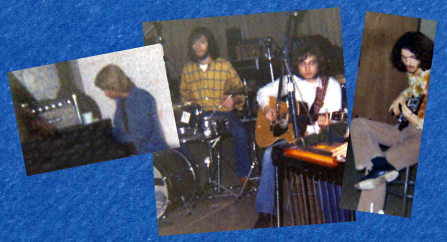
Below: The front and back day-
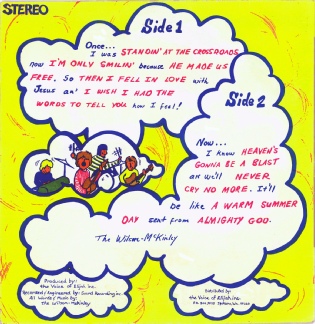
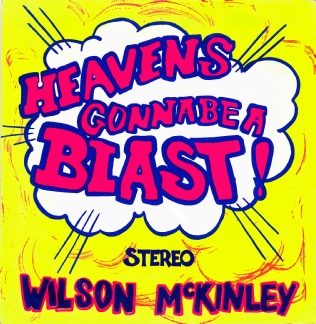
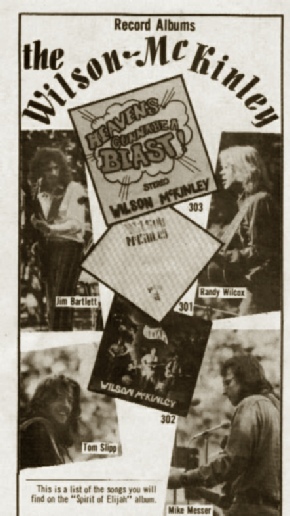
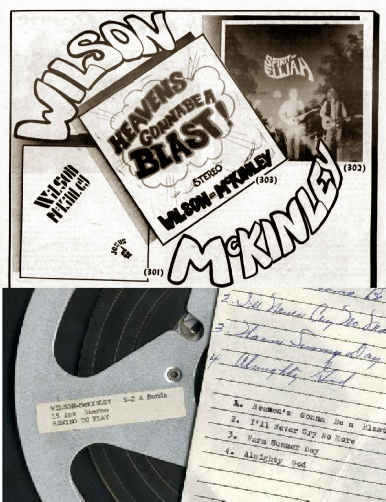

Above: Three cuttings from Truth papers after the third LP was released, including
a blurry blurb about the purpose and hoped-
Released and Unreleased: the Country in the Sky Cassette Project
By 1973, the Voice of Elijah ministry had closed down its coffeehouse and had moved
out of town to a site about 40 miles from Spokane, that they called “The Ranch.”
The band was at the peak of their creative and musical powers, but their leadership
decided to set aside the Christian Rock in favor of a musical style that would appeal
to older audiences. The wisdom of that move is not to be debated here; thankfully
the band kept up their rock persona in live appearances, and kept writing songs in
that style in the hopes that another Jesus Rock LP would materialize. Some of those
tracks survive in cassette dubs of live performances. They wanted to continue their
Jesus Rock career on record, but it was not to be. The next project went straight
to cassette (a much more dubious medium in the mid-
The other saving grace of the project is the songwriting. The band rose to the challenge
of the new stylistic constraints, and wrote a pile of truly wonderful songs in a
quieter vein. Country in the Sky was a beautiful album released on a highly limited
medium, which originally found only a small audience. Instrumentally, the band’s
chance to try some adventurous acoustic guitar work and electric pedal effects make
these songs quite satisfying. The one person left totally bored was poor Tom, who
was relegated to swish, tap, swish tap for most of the projects. The songs are well-
There’s a Country in the Sky, where we all do long to see,
And we don’t have to die, to get a glimpse of how it’s going to be…
In short, they all proved in spades that they could radically change their style and be good at it. Most of the tracks from Country in the Sky grace the first CD, Message Brought to Us, and the two cover tunes are on Now I’m a Jesus Freak.
Of perhaps even more interest than the songs on the cassette were the tunes that
for some reason were left off of it. When the collection of master tapes surfaced,
so did a pile of unlabeled practice reels, all recorded in mono, and all featuring
songs in various levels of completion. But the four complete numbers from that collection
show that a full twelve song LP would have given the Wilson McKinley a well-
Looking in my past, I was moving much too fast,
I took the fruit of knowledge, and I wept,
But now my heart is filled with Everlasting Love,
Deep in the Arms of my Lord!
Sample Country in the Sky Practice Tapes Released On Now I’m a Jesus Freak CD:
A Horrible Misuse of Talent: the Yesterday / Forever Fiasco
Yet one more recording is in the official output of the Wilson McKinley: the cassette-
What does a Wilson McKinley instrumental album of hymns sound like? Occasionally awful, like the circus music effect of “How Great Thou Art.” Sometimes like the band of old, as in their credible instrumental of their own “Almighty God.” And on one occasion, it’s completely chaotic, as in the last minute of “Come By Here;” yes, the great Wilson McKinley did an instrumental of Kum Ba Ya! Towards the end, Randy and Tom both begin a chaotic little riff, ending in a frantic flurry of drumming and keyboard trills and Tom’s “Wipeout” laugh. The track ends as Jimmy calls out, “Hey, wait a minute!” The cassette version was carefully faded before that point, I assure you! The whole sorry project was like trying to get a racehorse to pull a hay wagon.
It was a pathetic waste of good talent. One track managed to rise above the mush, and even made it to the band’s live playlist as late as 1979: their jazzy remake of a Jesus People classic (“Jesus, Jesus, can I tell you how I feel, you have given us your Spirit, we love you so!”) Their approach definitely elevated the material, and the restored track of “Jesus, Jesus” ends disc one of Now I’m a Jesus Freak! So it’s the only two minutes of that album that is likely to be released, and trust me, I picked the best out of what is decidedly the worst idea of their careers. But it wasn’t their idea, nor were closing down the “I Am,” moving to “The Ranch” and curtailing their Jesus Rock recording right at the height of their ministry.
But the Wilson McKinley were still being sent out to witness and give concerts, raising enough money from subscriptions to Truth and sales of their albums to help keep the home ministry going. And on the road, they were free to play any songs they wished. The cassette tapes recorded by their sound man, Greg Beumer, show energy, vitality, and a steady stream of new material worthy of their reputation. And they embraced the new variety in their sound, including Gospel Quartet material as well as hard rock, Country Gospel, and the aforementioned instrumentals here and there. Due to the terrible fidelity of those live cassettes, it has been difficult to make the concerts sound reasonable, but from a song quality and performance point of view, it’s classic Wilson McKinley expanding their range, and well worth hearing. And to their credit, they tried to get approval to record a new album of original Jesus Rock, but were turned down. It’s also to their credit that they kept touring, ministering wholeheartedly to those in front of them.
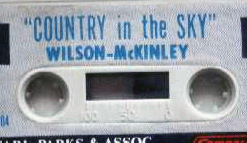


Left: A building at “The Ranch,” courtesy of one of its many visitors in the 1970’s. The ministry was centered there from 1973 to 1979. This building housed the kitchen, eating area, laundry room, offices, and the layout room for the Truth newspaper. Mike says he cut the lumber for most of the building.
The cassette-
Finding and listening to the original masters was a revelation, as the sparkling
clarity of the originals came to light in full four-

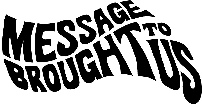

Samples from the CD mix of Country in the Sky (from Message Brought to Us):
Country in the Sky (title track)
Right: Three photos from a 1971 recording session backing up a solo artist in the Sound Recordings studio, months before the Heaven’s Gonna Be a Blast sessions. These snapshots turn out to be the only color photos of the Wilson McKinley that have surfaced.
Sample tracks from the 1974 cassette-
(Sample) Jesus, Jesus — this track was in their live concerts until 1979
(Complete track, not on CD) Almighty God — This was their own composition, and otherwise unknown. But done as an instrumental, it is one of the few high points of a terrible and disappointing project. Take my word for it! Members of the band had to be persuaded to include any tracks from this project on their CD anthologies!
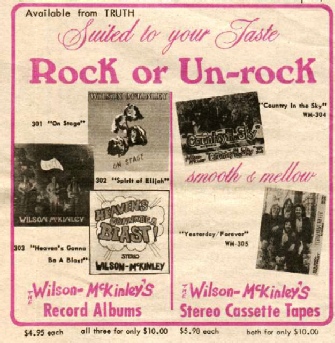

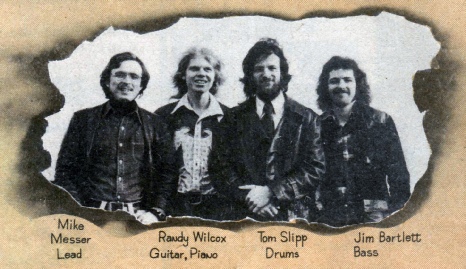
Greg Beumer’s Recording Project, 1976
In the studio, the Wilson McKinley finally got to go out with a bang, when their
longtime sound man asked them to be his recording project for a class he was taking
at a Spokane college. I believe the original was on 16 tracks, but the mixdown which
Greg provided me on half-
Mike says that by that time in their ministry, they had been discouraged from writing
many songs by the general deterioration of their organization, and opted for two
cover songs, one by the Staple Singers and another a traditional spiritual. “You
Don’t Knock” features Jimmy back in splendid Rock form, and has an amazing three-
By this time the band was facing moral and spiritual failings all around them (none of their own doing), and by the late 1970’s, Tom had left the band, replaced by newcomer Barney Dasovich. They loved being on the road, and providing music for street meetings, but after 1975, those opportunities were few and far between. So the recordings of Greg Beumer’s project are a happy addition in an otherwise dark time.
The Wilson McKinley’s last studio recordings: The Greg Beumer sessions, mixed down from 16 tracks in 1976.
(Sample) You Don’t Knock – a cover of a Staples Singers track.
(Sample) Ain’t That Good News – one of several spirituals that were very effective in concert. “I’ll Live Again” and “Couldn’t Keep It To Myself” were two others that would have been scorchers in studio versions!
The Lessons and Legacy of the Wilson McKinley
The ten-
The ministry they were part of was changing, and so was the Jesus Movement. The
band’s last project of instrumental hymns was an extreme example of what was happening
everywhere. The Jesus Movement was moving out of the streets and into the churches,
bringing new vitality into old organizations, and by so doing becoming mainstream
itself. New denominations such as the Vineyard and Calvary Chapel fellowships owed
their start to the Jesus Movement, and retain some of that flavor today. Worship
bands and Contemporary Christian Music artists (although most don’t realize it) owe
so much to the early pioneers such as the Wilson McKinley, who proved to street people
and church-
All it ever meant to you was sitting in a pew,
Reciting all the liturgies you knew,
But that’s OK, ‘cause now that you can walk and talk with Jesus,
There’s a well of Living Water flowing through!
(“Welcome Back Home,” from the “I Am” Coffeehouse tapes)
So by the mid-
Even today, some recognize and celebrate the remarkable achievements of that ministry, while others repudiate it. The Wilson McKinley as a unit was clearly part of the glue that held the ministry together for so long, even as the upper leadership wavered and faltered. That alone is a testament to their servant hearts, and to the strength of their calling. There were always a few people in every Jesus People fellowship who were along for the ride, caught up in the excitement of the moment (“Jesus Tripping,” we used to call it). But others made it into the Kingdom of Heaven, and are there for the duration. And stories keep pouring in of a chance meeting in a park somewhere, or of stepping into a coffeehouse, or of listening to a friend’s album, that eventually led someone to a whole new Eternity.
What then is the legacy of the Wilson McKinley? The larger question is what assurance do you and I have (as musicians, teachers, leaders and volunteers of all sorts) that our own work will endure for eternity? The first and most obvious fact is that there is only one kind of believer in Jesus, the kind of person who “hears His voice” and “produces fruit that endures.” You may have been raised on Rock or born listening to organ and chimes. But at some point, you either gave your life to Jesus or you didn’t. If you did, then you have an instant and unbreakable kinship with any other believer anywhere and from any generation. If you haven’t yet decided to follow Jesus, then it’s really a shame how the Wilson McKinley wasted all that talent on that religious stuff, and you listen to the licks and ignore the Lord. In that case, the story of the Wilson McKinley is a story of squandered talent and wasted opportunities, a lesson in the dangers of “going off the deep end.”
For me as a believer, the story of the Wilson McKinley is the story of some remarkable brethren who were willing to be used of God to reach their generation, and who took to that calling with all their heart and soul. And because they were participants in bringing new believers into the Kingdom, their legacy will never fade, because it is of eternal consequence. To the third category of person, trying to be neither believer nor heathen, hiding in the trappings of the movement as a “Jesus Tripper,” I leave you these thoughts from Carl Parks and Mike Messer. When I asked each of them what it was like to be on the cutting edge of ministry, to have helped to found a whole genre of music, to have been prominent in a major cultural movement, Carl Parks said, “We were never seeking to start a movement. We were only looking for revival.” Mike Messer simply said, “It’s the believer’s job to find out what God is doing, and then go do it. The servant’s heart is the heart that’s closest to Christ.”
Thank you to Randy, Mike, Tom, Jimmy, Barney, Greg and all the other ministry friends who contributed to this amazing story. Thank you for being faithful and for leaving us such a fantastic legacy.
They have sung the truth, lived the life, kept the faith, and borne fruit that remains. May we do the same!
By Timothy Smith, Tanignak Productions, originally posted 1999, expanded in 2021 honoring the Fiftieth Anniversary of the first Jesus Rock band, the Wilson McKinley!
Top right: Randy Berk’s artwork to look like the “Spirit of Elijah” logo. Left, the 1973 publicity shot used on the cover of the CD (Bottom Right).
Below Left: A scan of the cover art of Yesterday / Forever (1974). Below Right: a
1975 ad in Truth touting “Rock or Un-
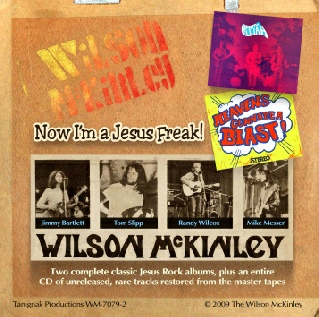
Left: the Now I’m a Jesus Freak cover art, based on the original On Stage handmade cover. The two LP’s pictured are on disc one, and disc two has practice songs, live tracks, and three new songs from band members.
Making official releases, from superior-
At Their Best Live! The Rolled Away the Stone Release
When the decision was made to release Now I’m a Jesus Freak as a double CD, it gave
us the opportunity to put many of the band’s most important tracks out in a single
package. A 45-
That LIVE album, titled Rolled Away The Stone! (LIVE! 1970 -
The Soundtrack to Revival (The Very Soul of the Jesus Movement)
Some of the Wilson McKinley’s most memorable and important tracks are on this album. But what the songs serve as the soundtrack to a genuine revival, as Jimmy put it while introducing a song: “If we all work hand in hand in one accord, there’ll be souls saved and seeds sown.” The heart and soul of the worldwide “Jesus Movement” can be heard in the songs on this album!
Disc One has about 46 minutes of good stereo recordings from the “I AM” coffeehouse
in downtown Spokane in 1971-
Disc Two is all mono, and all historic, including a mini-
The sound samples below give a little hint of what the Wilson McKinley Jesus Band was like in concert. I’ve included some great live photos.
Gonzaga University, November 1970 Outdoor Concert:
(Sample) Won’t You Come
(Complete) He’s Coming in the Clouds
“I Am” Coffee House, 1971-
(Sample) He Is A Friend of Mine
(Sample) Welcome Back Home
(Sample) Rolled Away the Stone
Kellogg, Idaho (Silver Valley), 1971-
(Sample) King of Love
(Complete) Give Your Heart to Him – the band’s live jam sound, with mostly lost vocals
(Complete) I Need a Saviour
“Moby “ Rock Concert, Coeur D’Alene, Idaho, 1971-
(Complete) Vote for Jesus/He’s Coming Soon – another example of WM as a boogie band
(Complete) Crown of Glory – the band was working out the arrangement of this song, that ended up on Spirit of Elijah. It’s fun to hear a flubbed vocal and quick save in this great, short song.
Highbridge Park, Spokane outdoor concert 1972
(Complete) Heaven’s Gonna Be a Blast — a chance to hear live instruments in full
stereo (but off-
Calgary, Alberta, Canada 1974
(Complete) Even the Birds Up In the Sky — a very different arrangement from the track on the Now I’m a Jesus Freak album.
(Sample) Did You Know That Man — Jimmy Bartlett in his most soulful vocal, retelling the story of the Woman at the Well.
Fort Wayne, Indiana 1975
(Sample) We See Jesus Coming (plus band intro)
Final Recorded Concert, “The Ranch,” Spokane Valley, May, 1979 (Barney Dasovich on drums)
(Sample) I Know He Saved Me
(Sample) Spirit of Elijah — possibly the wildest version
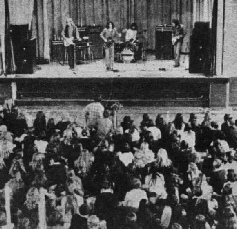
Above: An assembly concert at a Spokane high school, 1971
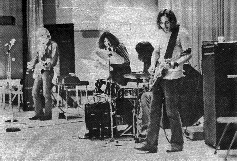
Above: The Wilson McKinley at a minimum-
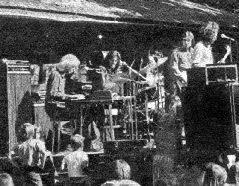
Above: The Wilson McKinley at Highbridge Park in Spokane, 1972 (with a fan club of kids!)
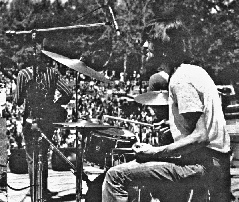
Above: The Wilson McKinley at an outdoor rally, Palo Alto, California (date unknown)
The Above Logo takes you to the band’s “Info Page”
To Find Out More About Tanignak.com, Click HERE
To Visit My “About Me” Page, Click HERE
To Return to Tanignak HOME, Click the Logo Below:
The audio songs and samples on Tanignak.com are copyright their respective owners and are used with permission. All Wilson McKinley tracks are administered by Tanignak Productions unless otherwise noted. Tanignak Productions uses proceeds from CD sales for royalties or for production of future albums, according to the band’s direction.
Information from this site can be used for non-




Right: the latest release, Rolled Away The Stone! Two complete CD’s, one in full stereo and one in mono.
A few of the tracks were previously released. The On Stage tracks are from the 1970 mono LP, and my mix of two short sets of stereo tracks recorded by James Zehm in Idaho were released as part of a whole CD on his label. But two thirds of the tracks are first issues, including 46 minutes from the “I AM” and almost 40 minutes from their last recorded concert at “The Ranch” in 1979.
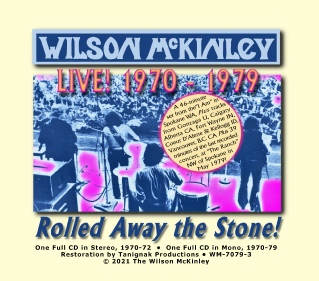
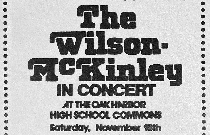

A Ten-
The photo Below Left was taken shortly after the band moved to “The Ranch” in 1972 and the spirit of revival was still the driving force of the ministry they were part of. It is to their great credit that they kept to their calling for as long as they did, ending up spending ten years in dynamic music ministry.
Below Right: a photo of the band in 1977, the last photo I have of the original Jesus People lineup. All are smiling to a point, but no grins anywhere – there were dangerous trends and damaging decisions being made in their ministry, of which they had no control. Within a couple of years, the entire ministry collapsed.
Below: Part of a poster promoting the Wilson McKinley’s last concert, in 1979, from the collection of Barney Dasovich. Left to Right: Barney Dasovich, Jimmy Bartlett, Mike Messer, and Randy Wilcox.
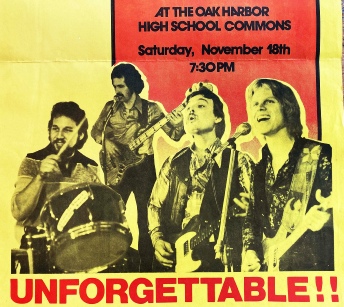
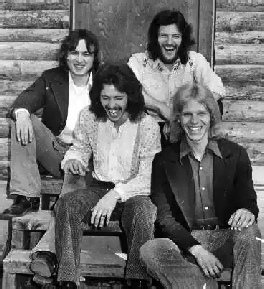
Check Below for a Musical Overview, 1970 — 1979
Besides being faithful brothers in Christ and servants to Him and their ministry for a decade, the members of the Wilson McKinley were excellent musicians and songwriters, helping to define an entire new genre of music: Jesus Rock. The examples below share the group’s faith through song, and trace their styles as well. Each track expresses their faith and their witness, from their first six months in ministry to their final recorded concert. This makes a fitting tribute to a band whose music has blessed people for fifty years!
The tracks below show variations in style, development in arrangements and songwriting, and especially, the band’s unwavering faith in Jesus and tireless work to witness for Him.
(Complete) I Just Love My Jesus – one of the first songs they wrote, sung here at an outdoor concert at Gonzaga University, November, 1970. (Intermittent stereo from a flawed tape)
(Sample) Ship Adrift — a 1973 Country Gospel number (author unknown) that shows the
band’s ability to sing beautifully harmonious music after years of performing what
their contemporaries called first class “hippie rock” and “psych-
(Complete) There’ll Come a Time — this 1973 practice tape illustrates their amazing songwriting talent; they sang this lovely song and then basically forgot about it. But their maturing faith in Christ is in evidence in the thoughtful lyrics. (Mono)
(Two-
Go to the Wilson McKinley “Sound Samples Page” for a downloadable album of unreleased tracks and samples of a possible new album of radically remixed WM songs!
For any of their CD albums, at the best price on the web, go to “Music Products Page” (Links Below)
